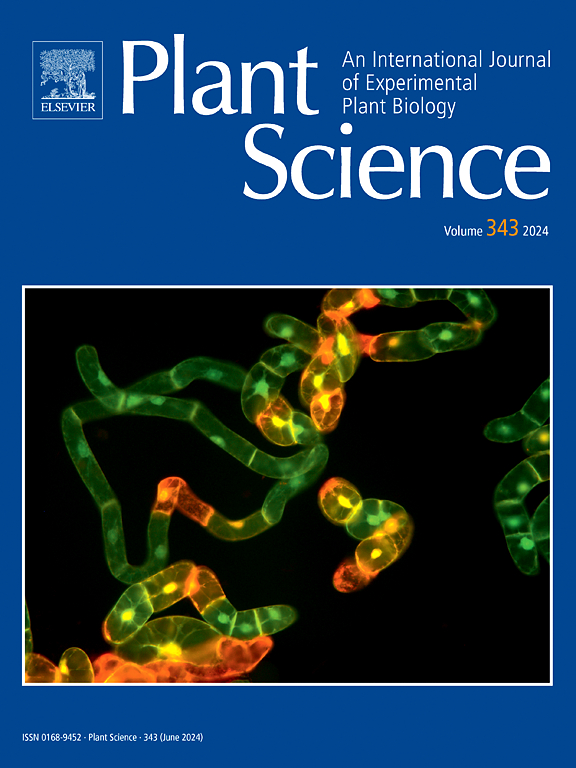WRKY转录因子SbWRKY51正调控高粱耐盐性。
IF 4.1
2区 生物学
Q2 BIOCHEMISTRY & MOLECULAR BIOLOGY
引用次数: 0
摘要
盐胁迫是影响植物生长发育和作物产量的主要非生物胁迫之一。大量研究报道了WRKY基因家族在植物对盐胁迫的响应中发挥重要作用,但其潜在机制尚不清楚,对高粱WRKY蛋白的研究也很有限。在这项研究中,我们鉴定了编码II组WRKY转录因子的高粱基因SbWRKY51。在盐胁迫、干旱和ABA胁迫下,SbWRKY51的表达上调。通过根际农杆菌介导的毛状根转化过表达SbWRKY51增强了高粱的耐盐性,与野生型(WT)相比,其根长更长,生物量积累增加,Na+含量降低,抗氧化酶活性提高。SbWRKY51异位表达在拟南芥中表现出相似的表型,同源基因AtWRKY11的突变增加了拟南芥的盐敏感性。盐胁迫下,sbwrky51过表达的转基因高粱氧化应激和木质素生物合成相关基因表达水平改变,木质素含量增加。因此,这些结果表明SbWRKY51通过影响木质素的生物合成正向调节高粱的耐盐性。本文章由计算机程序翻译,如有差异,请以英文原文为准。
The WRKY Transcription Factor SbWRKY51 Positively Regulates Salt Tolerance of Sorghum
Salt stress is one of the main abiotic stresses that affects plant growth and development, as well as crop yield. A large number of studies have reported that the WRKY gene family plays significant roles in the plant responses to salt stress, but the underlying mechanisms remain largely unknown, and research on WRKY proteins in sorghum is also limited. In this study, we identified the sorghum gene SbWRKY51, which encodes a group II WRKY transcription factor. The expression of SbWRKY51 was up-regulated by salt stress, drought, and abscisic acid (ABA) in sorghum. Overexpression of SbWRKY51 via Agrobacterium rhizogenes-mediated hairy root transformation enhanced salt tolerance of sorghum with longer root length, increased biomass accumulation, less Na+ content, and higher antioxidant enzyme activities compared with wild-type (WT) plants. Ectopic expression of SbWRKY51 in Arabidopsis showed similar phenotypes, and mutation of the homologous gene AtWRKY11 increased salt sensitivity of Arabidopsis. Under salt stress, the SbWRKY51-overexpressed transgenic sorghum showed altered expression levels of genes related to oxidative stress and lignin biosynthesis, as well as increased lignin content. Thus, these results suggest that SbWRKY51 positively regulates salt tolerance in sorghum by affecting lignin biosynthesis.
求助全文
通过发布文献求助,成功后即可免费获取论文全文。
去求助
来源期刊

Plant Science
生物-生化与分子生物学
CiteScore
9.10
自引率
1.90%
发文量
322
审稿时长
33 days
期刊介绍:
Plant Science will publish in the minimum of time, research manuscripts as well as commissioned reviews and commentaries recommended by its referees in all areas of experimental plant biology with emphasis in the broad areas of genomics, proteomics, biochemistry (including enzymology), physiology, cell biology, development, genetics, functional plant breeding, systems biology and the interaction of plants with the environment.
Manuscripts for full consideration should be written concisely and essentially as a final report. The main criterion for publication is that the manuscript must contain original and significant insights that lead to a better understanding of fundamental plant biology. Papers centering on plant cell culture should be of interest to a wide audience and methods employed result in a substantial improvement over existing established techniques and approaches. Methods papers are welcome only when the technique(s) described is novel or provides a major advancement of established protocols.
 求助内容:
求助内容: 应助结果提醒方式:
应助结果提醒方式:


